93042
Phalloidin–Atto 590
suitable for fluorescence, ≥90%
Sign Into View Organizational & Contract Pricing
All Photos(1)
About This Item
UNSPSC Code:
12352108
NACRES:
NA.32
Assay
≥90%
form
solid
mol wt
Mw 1473 g/mol
manufacturer/tradename
ATTO-TEC GmbH
fluorescence
λex 594 nm; λem 624 nm in 0.1 M phosphate pH 7.0
suitability
suitable for fluorescence
storage temp.
−20°C
General description
Atto 590 is a novel fluorescent label that belongs to the class of Rhodamine dyes. It shows a strong absorption, high fluorescence quantum yield, high thermal and photostability, and a very little triplet formation. Atto 590 consists of a mixture of two isomers with practically identical optical absorption and emission Phalloidin is a fungal toxin isolated from the poisonous mushroom Amanita phalloides. Its toxicity is attributed to the ability to bind F actin in liver and muscle cells. As a result of binding phalloidin, actin filaments become strongly stabilized. Phalloidin has been found to bind only to polymeric and oligomeric forms of actin, and not to monomeric actin. The dissociation constant of the actin-phalloidin complex has been determined to be on the order of 3 x 10-8. Phalloidin differs from amanitin in rapidity of action; at high dose levels, death of mice or rats occurs within 1 or 2 hours. Fluorescent conjugates of phalloidin are used to label actin filaments for histological applications. Some structural features of phalloidin are required for the binding to actin. However, the side chain of amino acid 7 (g-d-dihydroxyleucine) is accessible for chemical modifications without appreciable loss of affinity for actin.
find more information here
find more information here
Storage Class Code
11 - Combustible Solids
WGK
WGK 3
Flash Point(F)
Not applicable
Flash Point(C)
Not applicable
Certificates of Analysis (COA)
Search for Certificates of Analysis (COA) by entering the products Lot/Batch Number. Lot and Batch Numbers can be found on a product’s label following the words ‘Lot’ or ‘Batch’.
Already Own This Product?
Find documentation for the products that you have recently purchased in the Document Library.
Customers Also Viewed
Yu Zhang et al.
Aging, 10(12), 3736-3744 (2018-12-18)
Protein kinase D (PKD) subfamily which includes PKD1, PKD2 and PKD3 is a novel family of serine/threonine kinases. PKD has been widely implicated in the regulation of multiple physiological effects including immune responses, apoptosis and cell proliferation. However, the roles
Yu Zhang et al.
Journal of cellular physiology, 234(10), 18513-18523 (2019-03-27)
Cytoskeleton which includes microtubule and actin filaments plays important roles during mammalian oocyte maturation. In the present study, we showed that protein kinase C mu (PKC mu) was one potential key molecule which affected cytoskeleton dynamics in mouse oocytes. Our
Stimulated emission depletion-based raster image correlation spectroscopy reveals biomolecular dynamics in live cells.
Hedde P.N.; et al.
Nature Communications, 4, 2093-2093 (2013)
Munc18-1 Tuning of Vesicle Merger and Fusion Pore Properties.
Jorgacevski, J.; et al.
The Journal of Neuroscience, 31(24), 9055-9066 (2011)
SNARE Function Is Not Involved in Early Endosome Docking.
Geumann, U.; et al.
Molecular Biology of the Cell, 19(12), 5327-5337 (2008)
Our team of scientists has experience in all areas of research including Life Science, Material Science, Chemical Synthesis, Chromatography, Analytical and many others.
Contact Technical Service



